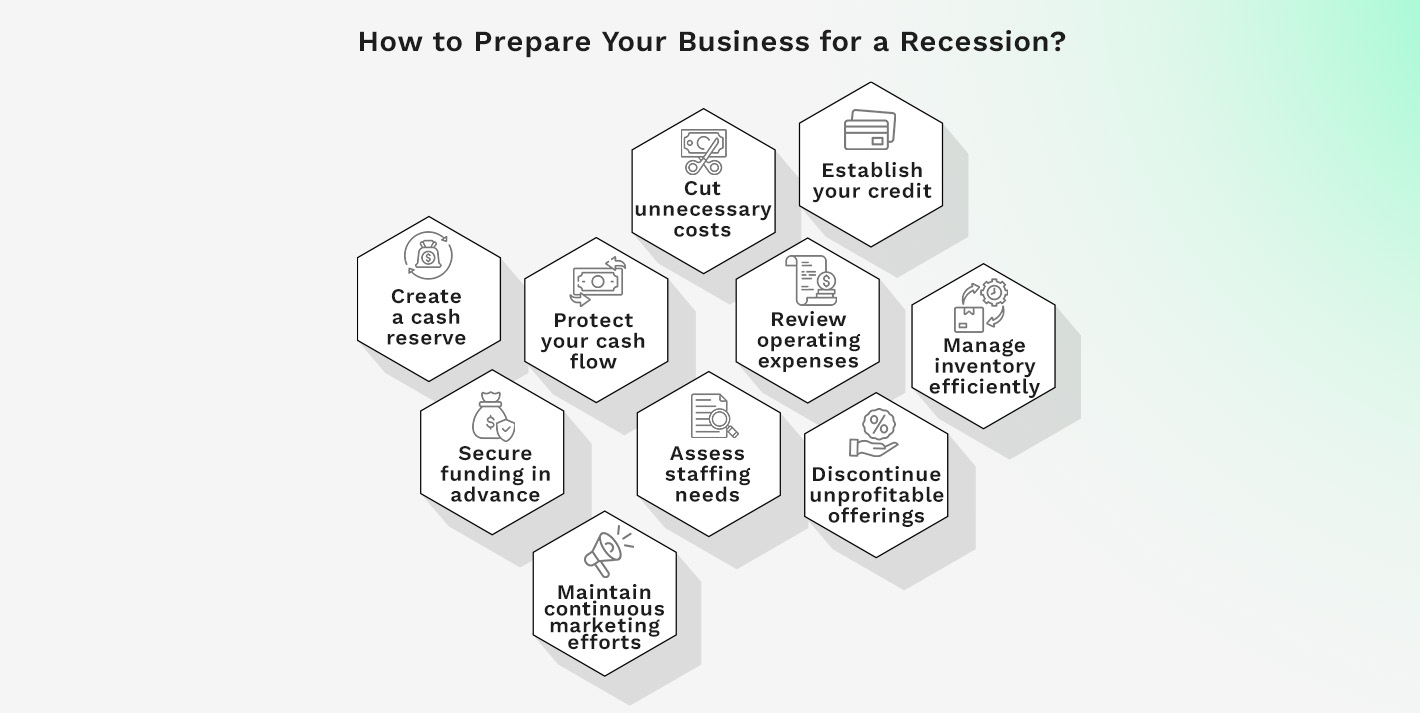You've likely heard the term "recession" in economic news or perhaps experienced one yourself. Financial landscapes are shifting rapidly, so understanding and preparing for economic downturns is more important than ever.
This post will provide you with the knowledge and strategies to help weather any financial storm.
What Is a Recession?
A recession is a time when businesses slow down, job opportunities shrink, and wallets feel a bit lighter. Economists often spot a recession when the country's gross domestic product (GDP) declines for two consecutive quarters.
This dip in economic activity usually leads to reduced consumer spending, a decrease in manufacturing, and a drop in confidence among investors and consumers alike. In the Great Recession that lasted from December 2007 to June 2009, the US saw a GDP decline of 4% and an unemployment rate of 10.1%.
How Does a Recession Affect Businesses?
During a recession, customers hold onto their purse strings, leading to a significant dip in company sales. This reduction in revenue can be especially harsh for small and medium-sized enterprises with limited financial padding. In the first two years of the Great Recession, about 1.8 million small businesses went out of business in the U.S.
Businesses may also have to deal with credit crunches, where loans and lines of credit become harder to obtain or have steeper interest rates. Stock volatility can impact businesses looking to invest or those reliant on shareholder confidence. Organizations might also face difficult decisions, such as workforce reductions or halting expansion plans to stay afloat. This impacts their operations and the livelihood of their employees.
How to Prepare Your Business for a Recession
Preparing your business for a recession can help you weather economic downturns and safeguard your operations. Here are some steps to prepare your business for a recession.
Create a cash reserve
Building a cash reserve is a strategic move to cushion against potential financial shocks. Experts suggest stashing away at least 6-12 months of operating expenses.
Creating this reserve might involve streamlining accounts receivables, postponing non-critical investments, or setting aside a fixed percentage of revenue over time. It's about finding that sweet spot where your cash reserve is robust enough to sustain operations during rough patches but not so large that it inhibits business growth.
Protect your cash flow
Ensuring a steady inflow of cash means making defensive and offensive maneuvers to keep your funds flowing. Aggressively manage your accounts receivable: communicate often and transparently with clients about your expectations and their obligations. Adapt your billing to be regular and predictable, making your customers less likely to be caught off-guard.
Show compassion, but be firm with your debtors, reminding them of your mutual importance and the value you provide. Offer incentives for early payments, and don't consider trade credit insurance to safeguard against unpaid invoices that threaten to destabilize your cash position.
Cut unnecessary costs
Reevaluating and reducing non-crucial expenses ensures your business runs more efficiently. Analyze your expenses and identify areas where you can cut back without compromising the quality of your products or services. This can include modernizing technology to reduce overhead or renegotiating with suppliers to lower purchase costs.
Encourage a culture of cost-awareness within your team, where everyone is conscious of how their actions can save resources. These collective cutbacks could range from limiting business travel to switching to cost-effective marketing strategies.
Establish your credit
Your business’s creditworthiness often dictates its access to funding. Ensure you make timely payments to creditors and, if possible, early. Cultivating a good behavior score is critical in proving your trustworthiness to financial institutions.
Push to renegotiate terms with creditors, aiming for longer payment periods or early payment discounts. Doing this proactively, before economic downturns, could offer your business much-needed breathing room later on.
Review operating expenses
Analyze your variable costs, such as utilities, supplies, and rent. Consider whether there's a more cost-effective way of fulfilling these needs or whether certain services can be renegotiated or eliminated.
Lean on technology to automate processes where you can, reducing manual labor and the scope for error. Assess your subscriptions and memberships, too, as every little bit adds up. The objective is to streamline operations, ensuring every dollar spent invests toward sustenance and eventual growth.
Manage inventory efficiently
You don't want excess stock gathering dust because this means tying up valuable capital that could be invested in growth. Consider increasing your inventory turns to ensure your stock keeps moving and generating revenue.
Build strong relationships with your suppliers and establish partnerships. They can be valuable allies in managing inventory efficiently, ensuring you meet customer demand without overextending yourself. Flexible credit terms with suppliers can also make a big difference in managing inventory effectively. Partnerships like these can help companies mitigate risk without hampering inventory flow.
Secure funding in advance
The ideal time to seek funding isn't when you're cash-strapped but when the business thrives. Look for lines of credit, consider trade credit insurance, or explore government grants and loans before the recession strikes. This approach enables you to navigate economic downturns with the assurance of available capital. It also allows your business to seize opportunities that arise when competitors may be pulling back. You should create the best investor pitch deck you can because it will help convince investors to fund your business.
Insured receivables in your borrowing base are also a clever way to improve your funding capacity. Have these conversations with potential financiers early, build relationships, and lay the groundwork for support when you need it the most.
Assess staffing needs
Align your staffing strategy with the current and projected demand for your services or products. When revenue slows, consider reassigning roles, reducing hours, or, as a last resort, layoffs. However, downsizing isn't the only answer. According to Harvard Business Review, retraining and upskilling employees can also be a powerful tool during economic downturns.
Consider flexible staffing arrangements, too. Exploring options like freelancers or part-time workers allows you to fill gaps without overcommitting to long-term costs. Treat your staff well and keep morale high because engaged employees are your ambassadors, especially when times are tough.
Discontinue unprofitable offerings
Go through your portfolio, and you might be surprised that not everything contributes to your bottom line. Discontinue the products or services that are not giving you a healthy margin or are strategic enough to warrant their costs. Doing so frees up resources and allows you to focus on profitable and promising areas. This can lead to improved quality, better customer service, and a stronger position in the marketplace.
Maintain continuous marketing efforts
Maintaining a marketing presence can ensure your brand remains relevant and visible. It's a fine line between saving money and investing to maintain existing customer relationships and gain new ones.
Rather than wide-net traditional advertising, opt for targeted, cost-effective digital marketing campaigns. Building content, engaging through social media, and leveraging email marketing are ways to stay connected with your audience. Share stories of resilience, display thought leadership and clearly convey your value proposition. Customers want to hear about your products and how you can solve their pain points.
Research has shown that companies that continue advertising during a recession bounce back stronger when recovery begins. Consider Microsoft's Bing, which focused heavily on marketing during a slump and gained a foothold in the search engine market dominated by Google. Also, finding the right digital marketing agency will help you in executing effective strategies tailored to your business needs.

How Kohezion Can Help You Prepare for Recession
Kohezion's project management and database software can help you prepare if a recession is looming. Kohezion offers customized application development, allowing you to organize data, optimize processes, and track progress without coding.
Kohezion enables you to create comprehensive dashboards that provide real-time insights into your business's financial health, helping you make informed decisions. It streamlines workflows and ensures that everyone is on the same page.
Kohezion's tools can help you identify waste areas, improve cash flow, and manage inventory efficiently. Plus, tight project management can reduce operational inefficiencies, which is crucial when every dollar counts.
Conclusion
Understanding what a recession is and how it can impact your business is the first step toward preparing for stability. Empower your business with technology like Kohezion to stay organized, focused, and efficient, even as the economic tides turn. A recession can be a time of opportunity for innovation and growing market share, not just survival. So keep your marketing efforts alive, your inventory lean, and your workforce skilled and ready.
Start building with a free account
FAQs - Navigating Financial Stability in Challenging Times
Businesses in essential sectors like healthcare and consumer staples often thrive during a recession. People still need medical care, pharmaceuticals, and everyday items like food, personal hygiene, and household cleaning, making these industries more resilient.
Discount retailers and repair services also increase as consumers look for cost savings. Companies with strong balance sheets, minimal debt, and the ability to adapt quickly to changing market conditions can outperform their rivals and capture greater market share during tough economic times.
Luxury goods retailers and high-end service providers usually don’t do well during a recession as consumers prioritize essential spending. The travel and leisure industries, including hotels, airlines, and restaurants, tend to suffer too.
Due to decreased consumer and business investment, real estate and construction can also hit a slump. Businesses that rely on discretionary consumer spending are typically the hardest hit as purchasing power and consumer confidence decline.
Starting a business during a recession can be challenging, but it's not impossible. It has advantages, like less competition and more negotiating power with suppliers or landlords. However, you must have a solid business plan that addresses the unique challenges of a downturn. Focus on inherently recession-resistant industries, offer an innovative solution, or fulfill an emerging need. Maintaining lean operations, managing cash flow tightly, and having contingency plans are also essential.


